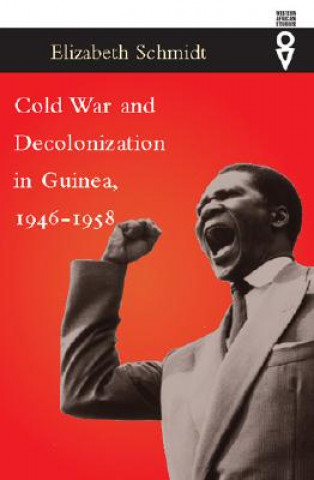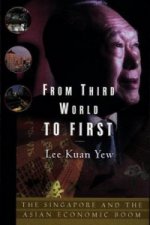
Code: 04935545
Cold War and Decolonization in Guinea, 1946-1958
by Elizabeth Schmidt
In September 1958, Guinea claimed its independence, rejecting a constitution that would have relegated it to junior partnership in the French Community. In all the French empire, Guinea was the only territory to vote "No." Orchest ... more
- Language:
 English
English - Binding: Hardback
- Number of pages: 320
Publisher: Ohio University Press, 2007
- More about this

93.98 €
RRP: 104.44 €
You save 10.47 €

Low in stock at our supplier
Shipping in 14 - 18 days
Potřebujete více kusů?Máte-li zájem o více kusů, prověřte, prosím, nejprve dostupnost titulu na naši zákaznické podpoře.
Add to wishlist
You might also like
-

RAF Southend
17.97 € -4 % -

So Cold the River
32.86 € -

Memories Counsels, and Reflections
38 € -

Woran starb das tote Meer?
10.78 € -4 % -

Recepty od babičky 7 Tvarohové zákusky a dezerty
1.43 € -29 %
Give this book as a present today
- Order book and choose Gift Order.
- We will send you book gift voucher at once. You can give it out to anyone.
- Book will be send to donee, nothing more to care about.
More about Cold War and Decolonization in Guinea, 1946-1958
You get 232 loyalty points
 Book synopsis
Book synopsis
In September 1958, Guinea claimed its independence, rejecting a constitution that would have relegated it to junior partnership in the French Community. In all the French empire, Guinea was the only territory to vote "No." Orchestrating the "No" vote was the Guinean branch of the Rassemblement Democratique Africain (RDA), an alliance of political parties with affiliates in French West and Equatorial Africa and the United Nations trusts of Togo and Cameroon. Although Guinea's stance vis-a-vis the 1958 constitution has been recognized as unique, until now the historical roots of this phenomenon have not been adequately explained. Clearly written and free of jargon, "Cold War and Decolonization in Guinea" argues that Guinea's vote for independence was the culmination of a decade-long struggle between local militants and political leaders for control of the political agenda. Since 1950, when RDA representatives in the French parliament severed their ties to the French Communist Party, conservative elements had dominated the RDA. In Guinea, local cadres had opposed the break. Victimized by the administration and sidelined by their own leaders, they quietly rebuilt the party from the base. Leftist militants, their voices muted throughout most of the decade, gained preeminence in 1958, when trade unionists, students, the party's women's and youth wings, and other grassroots actors pushed the Guinean RDA to endorse a "No" vote. Thus, Guinea's rejection of the proposed constitution in favor of immediate independence was not an isolated aberration. Rather, it was the outcome of years of political mobilization by activists who, despite Cold War repression, ultimately pushed the Guinean RDA to the left. The significance of this highly original book, based on previously unexamined archival records and oral interviews with grassroots activists, extends far beyond its primary subject. In illuminating the Guinean case, Elizabeth Schmidt helps us understand the dynamics of decolonization and its legacy for postindependence nation-building in many parts of the developing world. Examining Guinean history from the bottom up, Schmidt considers local politics within the larger context of the Cold War, making her book suitable for courses in African history and politics, diplomatic history, and Cold War history.
 Book details
Book details
Book category Knihy po anglicky Humanities History History: earliest times to present day
93.98 €
- Full title: Cold War and Decolonization in Guinea, 1946-1958
- Author: Elizabeth Schmidt
- Language:
 English
English - Binding: Hardback
- Number of pages: 320
- EAN: 9780821417638
- ISBN: 0821417630
- ID: 04935545
- Publisher: Ohio University Press
- Weight: 608 g
- Dimensions: 229 × 152 × 24 mm
- Date of publishing: 25. September 2007
Trending among others
-

Histories
5.33 € -29 % -

On Tyranny
10.26 € -24 % -

King Leopold's Ghost
13.24 € -17 % -

Rise and Fall of Ancient Egypt
18.79 € -23 % -

Who Paid The Piper?
14.47 € -23 % -

Sumerian Mythology
24.54 € -6 % -

Yoga Body
18.79 € -12 % -

Pakistan: A Hard Country
16.73 € -23 % -

Bayeux Tapestry
26.08 € -

Complete Royal Families of Ancient Egypt
23.62 € -

FN FAL Battle Rifle
17.76 € -23 % -

From Third World to First
14.47 € -23 % -

Meditations
9.23 € -19 % -

Peloponnesian War
13.34 € -23 % -

Chernobyl Prayer
10.67 € -21 % -

Lives of the Caesars
12.42 € -19 % -

Making Medieval Manuscripts
18.38 € -15 % -

Oxford History of Poland-Lithuania
72.10 € -

Guns, Germs, and Steel
16.84 € -

The Origins of Totalitarianism
10.36 € -23 % -

Illustrated Encyclopedia of Uniforms of World War I
22.07 € -23 % -

Postwar
16.53 € -24 % -

Tuesdays With Morrie
10.26 € -24 % -

Chickenhawk
12.32 € -23 % -

Underground
10.98 € -24 % -

Swerve
11.29 € -10 % -

Distant Mirror
14.47 € -23 % -

Complete Roman Army
22.07 € -23 % -

Age Of Capital
16.63 € -23 % -

Creation of Patriarchy
27.62 € -

Age Of Extremes
17.14 € -23 % -

John Skylitzes: A Synopsis of Byzantine History, 811-1057
38.41 € -17 % -

America's Secret Establishment
17.25 € -19 % -

Key of Solomon the King (Clavicula Salomonis)
11.80 € -

Travels of Ibn Battutah
12.32 € -23 % -

King's Two Bodies
27.21 € -13 % -

Caligula
3.58 € -24 % -

1913
12.32 € -23 % -

Armies of the Late Roman Empire AD 284 to 476
40.26 € -

Aquariums of Pyongyang
12.32 € -23 % -

Truman
21.15 € -23 % -

Anunnaki Homeworld
17.25 € -19 % -

Medusa
21.25 € -13 % -

History of the Ancient World
33.17 € -8 % -

Thank You for Being Late
12.83 € -24 % -

Infidel
11.08 € -18 % -

Your Money or Your Life - Economy & Religion in The Middle Ages
21.46 € -3 % -

24 Hours in Ancient Athens
10.16 € -22 % -

Cartoon History of the Universe III
24.03 € -8 %
Osobný odber Bratislava a 2642 dalších
Copyright ©2008-24 najlacnejsie-knihy.sk Všetky práva vyhradenéSúkromieCookies


 21 miliónov titulov
21 miliónov titulov Vrátenie do mesiaca
Vrátenie do mesiaca 02/210 210 99 (8-15.30h)
02/210 210 99 (8-15.30h)